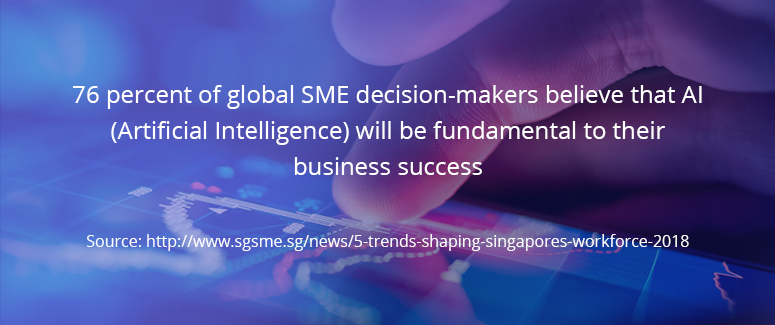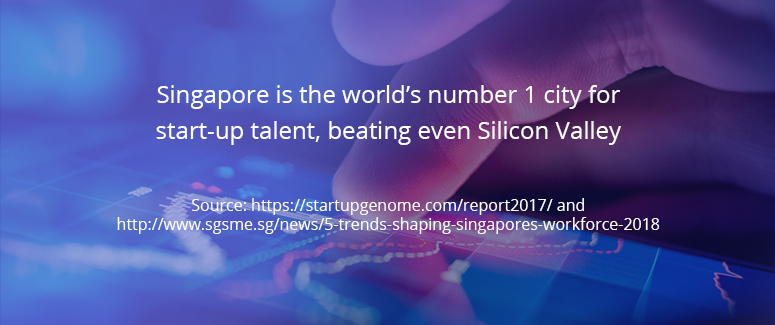While the common perception is that employers in Singapore tend to hire younger workers — who are often perceived to be more agile and adaptable — it might come as a pleasant surprise to know that a company at the forefront of new technology is open to hiring workers who aren’t millennials.
Kwa Kim Chiong, CEO and founder of Justlogin, a cloud-based human resource solutions company, sees both a benefit and value in employing older PMET workers who have a wealth of experience to share.
What are your feelings when it comes to older workers in our workplaces — and how does this affect your company’s recruitment?
Nowadays, tech companies are often perceived to hire millennials instead of more mature workers. This is probably because many are start-ups with millennials in key positions. However, this is not the case with Justlogin, which has been around for 19 years. We have a mix of workers within our company, including a few [older employees] ranging from 40 to 55 years old. Our oldest employees include our director of HR who is in her 50s.
I believe that having a diverse workforce helps create a more successful business as you can tap on a variety of strengths such as the creativity of the younger generation and the wealth of knowledge and experience of an older employee. I feel the value a person can add to a company does not depend on age.
We look at [a candidate’s] experience, skills and working attitude as we believe that older workers can make significant contributions to a company, especially in terms of their years of hands-on experience and practical knowledge. To do this we assess the person’s attitude towards work through their resume and experiences listed, and also at the interview stage.
Having a diverse workforce helps create a more successful business as you can tap on a variety of strengths such as the creativity of the younger generation and the wealth of knowledge and experience of an older employee
Whether young or old, having the skills and/or experience — and if not, the right attitude to learn what they need to — are crucial for job success.
What skills/qualities do you actively look for when hiring and is this the same when you hire older workers?
When it comes to hiring, whatever the age of the candidate, we look for the relevant experience and make an assessment of their attitude towards work. What we find is that older workers usually have more work experience, but they may not have the relevant experience in newer areas such as social media marketing or new software development methodology — areas we focus on in our company.
In such cases, we assess if their other experiences or skills outweigh their lack of expertise in these areas, and that these contribute to the team. This way it’s a win-win for everybody as we all learn and grow as a team.
It’s also good if the older staff is open to training in these new skills and is quick and open to learning on the job — we’ve had success with more mature candidates here, but of course, it depends on the individual.
And what if a candidate doesn’t have the “right” qualifications on paper?
It’s the same thing if they don’t possess the exact qualifications we are looking for. We look at his or her other plus points that are useful when it comes to performing in the role we are looking to fill. Based on our experience, qualifications are not crucial as long as the person is able to learn new skills quickly — which again is an assessment we have to make.
The first thing, we believe, is to give these workers a chance — otherwise, how will you know whether they can contribute to your company?
Many companies think that older workers may not be able to cope with the dynamic corporate landscape or lack the current skills to perform certain jobs, but this is not always the case. Sometimes their greater work experience can translate well for a company even though they may not have the relevant experience in newer areas such as social media marketing or new software development methodology.
Can you describe an example that stands out when you hired an older worker?
For example, we hired a retired senior IT executive who held a senior position in a multinational corporation to manage some aspects of our operations. Although his previous role was different from the role he was hired for in our company and he lacked experience dealing with SME customers and was unfamiliar with our products, he was able to draw parallels from his previous work experience, setting up processes and KPIs which had good results, both motivating our team and gaining their respect.
Do you think it’s harder for older workers to adapt to a new workplace or new processes?
The perception is that older workers take a longer time to accept change or new ways of doing things. However, this is a condition that goes across age — everybody can get used to working in a certain way, making it harder to change if need be.
Having said this, from my experience with older workers, it is easier to bring in an older worker to follow an existing unfamiliar process or adopt a new (to this person) system that has been running, than to get a worker already in the company to follow a new system or process. An instance here is when new staff of various ages joined us after we moved to a new cloud-based accounting software.
No matter what their age, none of them had any issues accepting the new system.
However, there was a lot of resistance from existing staff — again, not limited to their age. So, it shows that it depends on the person not the age when it comes to adopting new things. In general, it’s a human trait to not be able to accept change so easily.
Based on your experience of hiring older workers at your workplace, have there been any causes of friction or key challenges?
Typically, most of the older workers we have hired have of course held jobs in other companies and drawn a higher salary at these companies. Normally, many are not willing to lower their expectations too much.
Often, we find older workers who have accepted a lower salary or even a more junior position have a mindset in accordance with the Chinese proverb which translated says, “I have eaten more salt than you have eaten rice.”
Essentially what this means is that they have been around and gone through a great deal more than you, so you should respect their wealth of experience. This kind of attitude I feel may cause friction in the workplace. Both young and old have valuable insights and this should be shared so both sides can grow. Yes so therefore, age diversity at workplace is essential for any environment
As a business leader, you play a key role in shaping the future workforce. Follow us on LinkedIn for insights into building a resilient workforce, internal mobility, and the latest workforce trends.
Follow Workforce Singapore on LinkedIn
Stay ahead of the curve with expert advice on hiring, retention, and workforce development.



















